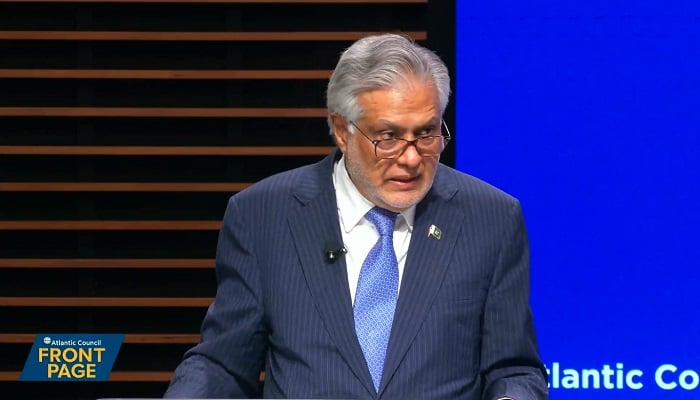WASHINGTON: Deputy Prime Minister and Foreign Minister Ishaq Dar said on Friday he was hopeful that a trade deal between Pakistan and the United States could be finalised in a matter of days, not weeks.
After a productive meeting with US Secretary of State Marco Rubio, Dar made the remarks while speaking at the Atlantic Council, a US-based think tank on international affairs.
“Ties between Pakistan and the US are getting better, and both sides have agreed to work on building a strong, long-term partnership,” said the deputy prime minister.
Dar said his meeting with Rubio covered a broad range of issues, with both sides agreeing to strengthen cooperation in trade, investment, technology, artificial intelligence (AI), and counter-terrorism.
“We also discussed regional and global matters.”
Dar thanked the President Donald Trump-led US administration for playing a helpful role in easing tensions between Pakistan and India.
He reaffirmed Pakistan’s commitment to close cooperation on global forums, including the UN Security Council, and stressed the need for dialogue in the Iran-Israel conflict.
Speaking on economic relations with Washington, the deputy prime minister said, “Pakistan wants trade, not aid.”
“Pakistan is planning to give greater access to American products in its markets and welcomes US investors in the mining sector.”
Pakistan-India tensions
Talking about Pakistan-India tensions, Dar said the two countries need to stop pointing fingers and start building trust if they want to move forward.
On the topic of terrorism, he said, “Pakistan is already taking action and doesn’t need to be told what to do.”
“India hasn’t given any proof that Pakistan was involved in the Pulwama attack, Dar said, adding, “India often uses terrorism to shift focus and avoid the real issue — the Kashmir dispute, which remains the main bone of contention between the two neighbours.”
He told the audience that India has tried several times to change the demographics of the region during its more than 70 years of illegal occupation.
Dar also recalled the events leading up to the ceasefire in May, stating that Pakistan ended its military operation in defence of its sovereignty.
He said Rubio had asked if Pakistan was ready for a ceasefire, to which he replied, “We weren’t ready to start a war in the first place.”
Dar said the US had promised to help set up talks between Pakistan and India at a neutral location.
“Pakistan is ready to talk about everything, from Kashmir to terrorism, but made it clear that the talks have to be two-sided.
“Pakistan can’t sit down alone and expect results,” the deputy PM said during his talk at the think tank.
“Pakistan wants no conflict with its neighbours,” he said. “We seek lasting peace in South Asia, built on trade and partnerships, not hostility.”
When asked about the US naming The Resistance Front (TRF) a terrorist group, Dar said Pakistan had no issue with the move, but he strongly disagreed with linking TRF to Lashkar-e-Taiba.
He said that the group was broken up years ago, its members were arrested and jailed, and “TRF has nothing to do with it.”
Long-term ties
The deputy prime minister said the US needs to move away from transactional ties and work towards a more strategic and stable relationship with Pakistan.
He made it clear that Pakistan’s defence deals with China would not affect its relations with the US, as such decisions depend on which country offers the better deal.
Dar also faced questions about Pakistan’s internal political situation.
‘Domestic ceasfire’
He said former PTI chairman Imran Khan used to meet him regularly and that he personally donated to Khan’s hospital.
He blamed Khan’s 2014 sit-in for halting economic progress and said he had tried to broker a “domestic ceasefire” at the time.
Dar criticised Khan for taking up arms against the state on May 9 and said such acts must be dealt with under the law, regardless of one’s popularity.
“No one has the right to attack military installations,” he said. “That’s not politics — that’s treason.”
Dr Afia Siddiqui case
Commenting on the US imprisonment of Dr Aafia Siddiqui, Dar said he had no objection to it if done under the law, but pointed out that attacking national installations in Pakistan was also an act of treason — a reference to PTI’s alleged violent politics.
Talking about terrorism and extremism, Dar praised former prime minister Nawaz Sharif for taking tough steps against militancy.
He criticised the PTI government for undoing that progress.
The deputy PM said they (Imran Khan-led regime) released over 100 militants, opened the borders, and let 30,000 to 40,000 Taliban fighters come back and regroup inside Pakistan.
“That one cup of tea brought armed rebellion back to life in Pakistan,” he said, in a sharp rebuke of the previous government’s policies.
Dar-Rubio meeting
US Secretary of State Marco Rubio had earlier praised Pakistan’s sacrifices in the war on terror during a meeting with DPM Dar, a rare high-level interaction between the two countries.
Ties between Islamabad and Washington have been improving after a long diplomatic freeze. The thaw became more visible last month when US President Donald Trump gave a warm welcome to Field Marshal Asim Munir at the White House.
In his first meeting with his Pakistani counterpart, which lasted for 40 minutes, Rubio acknowledged Pakistan’s unmatched sacrifices in the war on terror and praised the country’s constructive role in global and regional peace.

